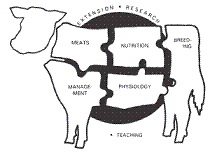Animal Science, Department of

Nebraska Beef Cattle Reports
Date of this Version
2022
Citation
2022 Nebraska Beef Cattle Report
UNL Beef, Institute of Agriculture and Natural Resources, University of Nebraska-Lincoln
Abstract
Stress in pregnant livestock causes pathological low birthweight of the offspring and diminishes their muscle growth capacity. Using sheep as a model for beef cattle, this study determined that the limited growth capacity of offspring with stress-induced low birthweight could be recovered by postnatal treatments. Muscle in these animals has less growth-promoting β2 adrenergic activity and thus the injectable β2 adrenergic stimulant clenbuterol was used as a daily treatment. Lambs with stress-induced low birthweight continued to exhibit impaired muscle growth and feed efficiency well past the normal age for weaning. In addition, they began to put on excess fat around the age of weaning, making them destined to produce less meritorious carcasses even at equivalent liveweights. Daily clenbuterol injections improved growth rates, metabolic efficiency, and body composition in lambs with stress-induced low birthweight. By demonstrating that changes in β2 adrenergic activity are valid targets for recovering growth performance and body composition, these findings provide the basis for practical on-farm strategies to improve outcomes in low birthweight livestock such as oral supplementation of clenbuterol or other β2 agonists.
Included in
Large or Food Animal and Equine Medicine Commons, Meat Science Commons, Veterinary Preventive Medicine, Epidemiology, and Public Health Commons

